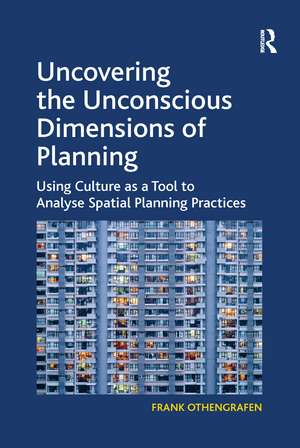Uncovering the Unconscious Dimensions of Planning: Using Culture as a Tool to Analyse Spatial Planning Practices
Autor Frank Othengrafenen Limba Engleză Paperback – 11 oct 2016
| Toate formatele și edițiile | Preț | Express |
|---|---|---|
| Paperback (1) | 464.54 lei 6-8 săpt. | |
| Taylor & Francis – 11 oct 2016 | 464.54 lei 6-8 săpt. | |
| Hardback (1) | 1059.45 lei 6-8 săpt. | |
| Taylor & Francis – 28 mai 2012 | 1059.45 lei 6-8 săpt. |
Preț: 464.54 lei
Nou
Puncte Express: 697
Preț estimativ în valută:
88.90€ • 96.53$ • 74.68£
88.90€ • 96.53$ • 74.68£
Carte tipărită la comandă
Livrare economică 23 aprilie-07 mai
Preluare comenzi: 021 569.72.76
Specificații
ISBN-13: 9781138248861
ISBN-10: 113824886X
Pagini: 248
Dimensiuni: 156 x 234 x 13 mm
Greutate: 0.34 kg
Ediția:1
Editura: Taylor & Francis
Colecția Routledge
Locul publicării:Oxford, United Kingdom
ISBN-10: 113824886X
Pagini: 248
Dimensiuni: 156 x 234 x 13 mm
Greutate: 0.34 kg
Ediția:1
Editura: Taylor & Francis
Colecția Routledge
Locul publicării:Oxford, United Kingdom
Cuprins
Contents: Preface; Introduction: why study planning culture? Planning culture as a determinant of planning practices; Part I The Conceptual Framework for Analysing Cultures: Spatial planning and development in Europe: the importance of cultural contexts; Contemporary spatial planning models and the absence of culture; Culture as an organising category: how to analyse culture and its impact on planning systematically?; The interpretative framework: a general outline for the analysis of planning practices. Part II Empirical Studies of Planning Practice: Planning culture in Hamburg, Germany: between thoroughness, uncertainty avoidance and commercial pragmatism; Planning cultures in Helsinki, Finland: local autonomy, romantic rural views and social justice; Synopsis of the empirical results and an evaluation of the interpretative framework. Part III Generalisation of the Results - Deduction of a Theoretical Model for the Systematic Analysis of Planning Cultures: The 'culturised planning model': a tool to analyse the taken-for-granted routines and perceptions underlying planning practices; Conclusions: reflections on the culturised planning model; References; Index.
Notă biografică
Frank Othengrafen, HafenCity University Hamburg, Germany
Recenzii
'Using a well grounded conceptual and empirical analysis, this book offers a significant step forward in the theorization and comprehension of planning practice within the complexity of changing cultural frameworks. This contribution is not only important for an improved planning theory but also has particular relevance to the European integration of spatial policies.' Luciano Vettoretto, University Iuav of Venice, Italy 'Othengrafen has produced an immensely rich resource on planning cultures in its many forms and guises. He synthesises an impressive collection of reading spanning a range of relevant but diverse theories - from anthropology and ethnography to complexity theory and neo-institutionalism - and identifies how these might be brought together to create an investigative framework and research agenda for exploring the cultures of spatial planning in fine detail. A recommended read for students and academics alike!' Dominic Stead, Delft University of Technology, The Netherlands '... offers an important contribution to our understanding of planning structures, planning systems, planning styles and planning practices, in different cultural contexts.' International Journal of E-Planning Research
Descriere
By adopting theoretical approaches from the fields of management studies, cultural studies and anthropology, and by using culture as an organising principle, this book develops an innovative framework which provides better insights into what culture is about, what the relations are between culture and planning and how culture influences planning practices.
